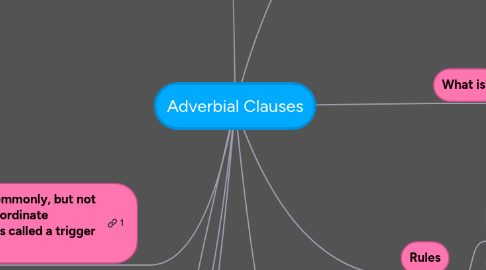Adverbial Clauses
por yisbel ortega


1. An adverbial clause is commonly, but not always, fronted by a subordinate conjunction—sometimes called a trigger word.
1.1. Mary, the aspiring actress, became upset as soon as she saw the casting list. (subject: she; predicate: saw the casting list; the clause modifies the verb became)
1.2. Peter Paul, the drama teacher, met with Mary after she came to the next class. (explicit subject: she; predicate: came to the next class.; predicate (verb): came; the clause modifies the verb met;)
1.3. He talked carefully in order to appear fair. He talked carefully in order .. [that 'he'] appear fair. (implied subject, he, is omitted; predicate (verb): appear; the clause modifies the adverb carefully)
1.4. The little boy preferred fierce dinosaurs, as T rex. The little boy preferred fierce dinosaurs, as [was] T rex. (subject of the clause: T rex; predicate of the clause: [was], implied; the clause modifies the adjective fierce.)
2. Cause and reason
2.1. They are a type of adverbial subordinate clauses (improper because they can not be replaced by an adverb, contrary to what happens with time, place and manner) that serve to explain the cause, motive or reason described in the main clause.
3. Result
3.1. (consecutive subordinate clauses) are those which will serve to express the result of the action given in the main clause.
4. Purpose
4.1. They are a type of subordinate clauses that serve to explain the purpose or purpose described in the main clause.
5. Three adverbs are they going to help form clauses of time , in short , they will express when ( at what time ) the action that indicates the verb of the sentence occurs
5.1. Examples
5.1.1. I buy a present before I go to a party. (Yo compro un regalo antes de ir a una fiesta)
5.1.2. I play video games after I finish my homework. (Yo juego videojuegos después de que termino mi tarea)
5.1.3. I feel great when I sleep well (Yo me siento genial cuando duermo bien)
6. What is?
6.1. Is a dependent clause that functions as an adverb
6.2. The entire clause modifies a verb, an adjective, or another adverb
6.3. As with all clauses, it contains a subject and predicate.
7. Functions of Adverbs
7.1. Adverbs modify verbs, adjectives, and other adverbs.
7.2. They tell why, when, where, how, how much, and how often an action occurs.
7.2.1. Verbs: We eat pizza weekly. She watched the wild animal carefully. Adjectives: That is a very nice person. The dog is extremely hyperactive. Adverbs: She sings quite beautifully. My dog is almost always starving.

